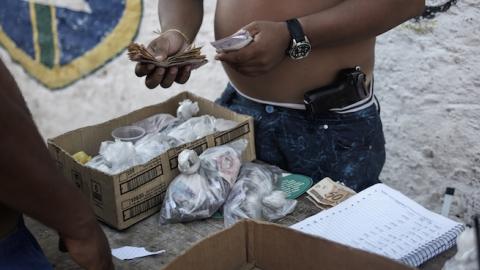The Sentencing Reform and Corrections Act now before Congress is based on a lie — that drug dealing is not a violent crime. Americans have been told this lie for years even as we witness the violence and death caused by drug dealers in our communities. Now, this lie is propelling legislation through Congress that will destroy more lives.
As former directors of the Office of National Drug Control Policy, we carry a particular responsibility to speak up when so many who should know better claim that drug trafficking has been treated too harshly under federal law.
Claims by President Obama and others that federal prisons are filled with "nonviolent drug offenders" and that drug dealing is a "victimless crime" are grotesquely dishonest. How can the drug trade be victimless when most Americans know a victim? How can it be non-violent when we witness the carnage every night on the local news?
The countless Americans victimized by drugs know the truth, as does anyone who has looked at the facts about America's prison population.
In the federal prison system, 99.5 percent of those incarcerated for drug convictions are guilty of serious trafficking offenses. And according to a Bureau of Justice Statistics study of state drug inmates, 77 percent reoffend within five years of release, with 25 percent committing violent offenses. Most of these convicted drug dealers are career criminals with long rap sheets. By softening punishments for these traffickers, as this legislation does, Congress would give convicted dealers shorter sentences and early release causing destruction to communities across America. Moreover, this push to release experienced traffickers is occurring at the same time our nation is enduring a 440-percent increase over the past seven years in heroin overdose deaths.
Drug dealing is inseparable from violent victimization. Illegal drugs kill tens of thousands each year in overdose deaths. More die in violent acts and accidents under the influence of drugs. Still more die slowly of blood-borne diseases contracted through injection drug use and through high-risk behavior while under the influence of drugs, including prostitution to support addiction. Street-level dealers look into the eyes of these victims daily as they take addicts' money and foster their self-destruction. Traffickers at levels above the street know this reality and take their wealth from it, spreading death across neighborhoods and across the globe.
No family that has lost a child or a mother or a brother to addiction can be told there are no victims. No school or community believes the empty rhetoric that a lost child was "only hurting herself." There are too many innocent victims, from the infants born addicted to the grandparent who stands beside the grave of the child of their child.
Considering all that America knows about drug addiction, only the dishonest or willfully blind can claim that drug trafficking is a non-violent crime. Drug dealing depends on addiction; addicts consume the vast majority of the drug supply; the dealer cultivates users to create more addicts in a murderous cycle.
Drug dealers know drugs will eventually impair judgment and bend free will, altering personality and poisoning bonds to loved ones. We know drug use and addiction degrade millions of lives —impairing education, employment and parenthood. Drugs are at the root of much of the child abuse, endangerment and domestic violence perpetrated against the innocent.
But the destruction is much wider. Addiction and drug dealing ravage whole communities, urban and rural. We need look no further than the daily reports of the heroin epidemic today, or the still-vivid memories of the meth epidemic and the crack epidemic. Drug dealing makes whole neighborhoods war zones, places of economic blight and large-scale victimization. There is no greater single source of actual harm to Americans today — none. The cost of incarcerating drug dealers is small compared to the true cost of their crimes to society.
Knowing this, it is an utterly irresponsible effort to release experienced drug dealers from federal prison before they have completed their just sentences, arguing they are merely misguided business people or desperate individuals caught up in an unfair system. The truth about drug dealing is this: It requires cruelty and willful indifference to the visible suffering inflicted on others — over and over again — harming individuals, families and whole communities.

















